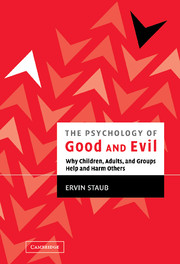Book contents
- Frontmatter
- Contents
- Preface
- Acknowledgments
- PART I INTRODUCTION AND CORE CONCEPTS
- PART II THE ROOTS OF HELPING OTHER PEOPLE IN NEED IN CONTRAST TO PASSIVITY
- PART III HOW CHILDREN BECOME CARING AND HELPFUL RATHER THAN HOSTILE AND AGGRESSIVE
- PART IV THE ORIGINS OF GENOCIDE, MASS KILLING, AND OTHER COLLECTIVE VIOLENCE
- PART V THE AFTERMATH OF MASS VIOLENCE: TRAUMA, HEALING, PREVENTION, AND RECONCILIATION
- 33 Preventing Group Violence
- 34 Kosovo: The Need for Flexible Bystander Response
- 35 The Effects of Violence on Groups and Their Members
- 36 Healing, Reconciliation, and Forgiving after Genocide and Other Collective Violence
- 37 Healing, Forgiveness, and Reconciliation in Rwanda: Project Summary and Outcome, with Addendum on Other Projects
- 38 Further Avenues to Prevention
- 39 Commentary: Human Destructiveness and the Refugee Experience
- 40 A Vision of Holocaust Education in Holocaust Centers and Schools
- 41 Out of Hiding
- 42 Review of Legacy of Silence: Encounters with Children of the Third Reich
- 43 What Can We Learn from This Tragedy? A Reaction Days after September 11, 2001
- PART VI CREATING CARING, MORALLY INCLUSIVE, PEACEFUL SOCIETIES
- Appendix: What Are Your Values and Goals?
- Index
37 - Healing, Forgiveness, and Reconciliation in Rwanda: Project Summary and Outcome, with Addendum on Other Projects
Published online by Cambridge University Press: 07 May 2010
- Frontmatter
- Contents
- Preface
- Acknowledgments
- PART I INTRODUCTION AND CORE CONCEPTS
- PART II THE ROOTS OF HELPING OTHER PEOPLE IN NEED IN CONTRAST TO PASSIVITY
- PART III HOW CHILDREN BECOME CARING AND HELPFUL RATHER THAN HOSTILE AND AGGRESSIVE
- PART IV THE ORIGINS OF GENOCIDE, MASS KILLING, AND OTHER COLLECTIVE VIOLENCE
- PART V THE AFTERMATH OF MASS VIOLENCE: TRAUMA, HEALING, PREVENTION, AND RECONCILIATION
- 33 Preventing Group Violence
- 34 Kosovo: The Need for Flexible Bystander Response
- 35 The Effects of Violence on Groups and Their Members
- 36 Healing, Reconciliation, and Forgiving after Genocide and Other Collective Violence
- 37 Healing, Forgiveness, and Reconciliation in Rwanda: Project Summary and Outcome, with Addendum on Other Projects
- 38 Further Avenues to Prevention
- 39 Commentary: Human Destructiveness and the Refugee Experience
- 40 A Vision of Holocaust Education in Holocaust Centers and Schools
- 41 Out of Hiding
- 42 Review of Legacy of Silence: Encounters with Children of the Third Reich
- 43 What Can We Learn from This Tragedy? A Reaction Days after September 11, 2001
- PART VI CREATING CARING, MORALLY INCLUSIVE, PEACEFUL SOCIETIES
- Appendix: What Are Your Values and Goals?
- Index
Summary
In this project, we provided training in a seminar/workshop to 30 people in Rwanda. They were mainly staff of NGOs that worked with groups of people in the community. These staff were working with religious and secular groups in the areas of healing and community building. To the extent we could determine, 21 of them were Tutsi and 9 Hutu (information about ethnicity is difficult to establish in Rwanda at this time). Our purpose was to prepare participants to use the training, or elements of it, in their own work with groups in the community. A primary purpose of the training was to promote psychological healing from the traumatic effects of the genocide as well as skills in promoting healing in others (in Tutsi survivors, in Tutsis who returned from other countries after the genocide, and Hutus who were affected by the violent actions of their own group and other aspects of the situation in Rwanda). The training also aimed to promote reconciliation, and in turn initiate a process of forgiveness, or more broadly, a more positive orientation toward members of the other group.
The training had psycho-educational and experiential components. The former consisted of lectures and discussion. One topic was the origins of genocide and mass killing. Brief lectures, based on the work of Ervin Staub (as described in his book, The Roots of Evil: The Origins of Genocide and Other Group Violence, and other publications) as well as other scholars, were followed by extensive discussion in which participants applied what they learned to understanding the genocide in Rwanda.
- Type
- Chapter
- Information
- The Psychology of Good and EvilWhy Children, Adults, and Groups Help and Harm Others, pp. 451 - 454Publisher: Cambridge University PressPrint publication year: 2003
- 1
- Cited by



